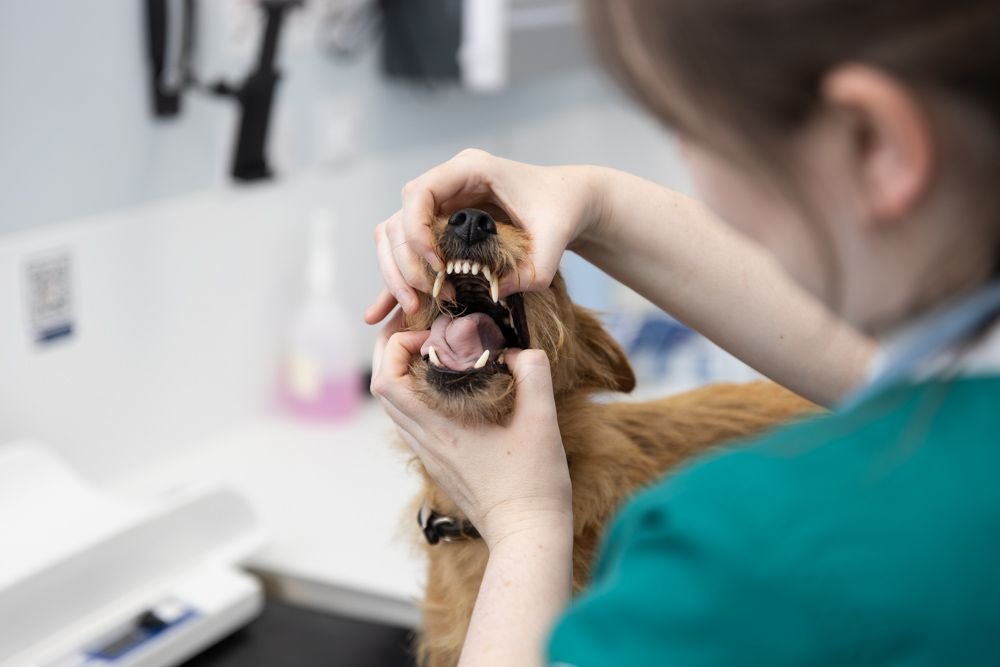Dentistry in Cats and Dogs!
Authored by Hollie Furey
Dentistry in Cats and Dogs!
Dental health is a crucial aspect of the overall well-being of your pet. Dental problems can lead to pain and discomfort. Poor oral hygiene can impact your pet’s quality of life causing difficulties eating that can result in weight loss. Regular veterinary check-ups include a dental examination where we can identify early signs of dental problems and recommend the appropriate treatment.
This article is to inform you about:
1) What common problems occur with dental disease in cats and dogs
2) Tips on how to prevent dental disease
3) How vets can treat dental disease
Common Dental Problems:
Periodontal Disease: involves inflammation and infection of the structures supporting the teeth including the gums and surrounding bone.
Symptoms may include bad breath (halitosis). Bad breath is often caused by the release of foul-smelling gases from the bacteria in the mouth. Inflamed or bleeding gums indicate gingivitis. Animals with dental issues may experience pain while eating leading to a change in eating habits such as preferring softer food or avoiding hard kibble. Pawing at the mouth is also a sign of dental discomfort.
Dental plaque and tartar: plaque is a thin film of bacteria that forms on the teeth. If the plaque is not removed it can mineralise into tartar.
Regular brushing of the teeth can help prevent the buildup of plaque and tartar.
Tooth decay: while tooth decay is less common in cats and dogs compared to humans, they can still experience decay especially if they consume a diet high in sugars. Feeding your pets a balanced and appropriate diet is essential for preventing tooth decay.
2. Preventative Care:
Diet: a nutritious and balanced diet contributes to overall health, including dental health. Specialised dental diets and dental chews are available to promote oral hygiene.
Brushing: regular tooth brushing is one of the most effective ways to prevent dental issues. Use a pet-specific toothbrush and toothpaste to clean your pet’s teeth. Start slowly and make the experience positive with treats and praise.
Dental chews and toys: these are designed to promote oral health. Chew toys can help reduce plaque and tartar buildup while also providing entertainment.
3. Veterinary Intervention:
Scale and Polish:
Prior to scaling and polishing, the pet is placed under anaesthesia and a dental probe is used to measure the gap between the tooth and the gum (sulcus) for each tooth.
Scaling is the process of removing plaque and tartar buildup from the teeth surfaces.
After scaling, the teeth are polished to smooth out any rough surfaces that could attract plaque. Polishing helps create a clean and smooth tooth surface making it more challenging for plaque to adhere.
Extractions:
Dental extractions are commonly performed in veterinary practice. While prevention and early intervention are essential for maintaining oral health, extractions become necessary when dental problems progress beyond reversible stages.
Reasons for Dental Extractions:
Severe tooth decay or fractures that compromise the structural integrity of a tooth may require extraction to prevent pain and infection.
Tooth Resorption: Cats can experience tooth resorption, a painful condition where the body reabsorbs the tooth structure. Affected teeth often require extraction.
Impacted or misaligned teeth can cause discomfort and lead to oral health issues. Extraction may be necessary to address these problems.
Dental abscesses and infections can spread to surrounding tissues and even affect vital organs. Extraction is often necessary to eliminate the source of infection.
Pain relief is a crucial aspect of post-operative care. Pain medications are prescribed to keep the pet comfortable during the recovery period.
A soft diet is recommended for approximately 2 weeks following the dental extractions to allow the extraction site to heal. Avoiding hard or abrasive foods helps prevent irritation and promotes recovery.
Conclusion
If you’d like to know more about dental disease and to see if your pet has a healthy mouth, click the button below:
If you’d like to book a consultation to discuss your pet’s teeth please call 0121 270 5800 or book online.



